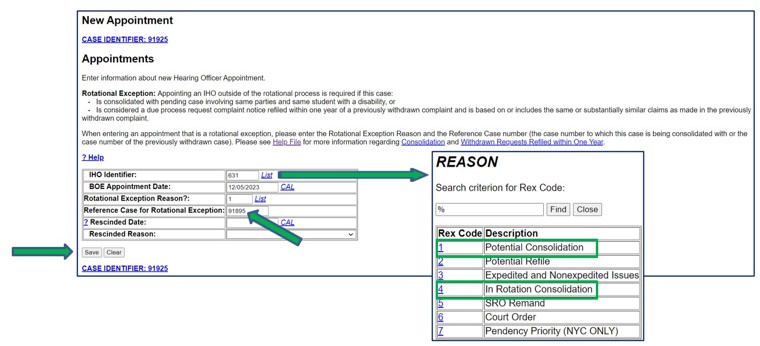When a subsequent due process complaint notice is filed while a due process complaint involving the same parties and student is pending before an IHO, the same IHO must be appointed to determine if the two cases should be consolidated into one case or heard separately. The district must, in their procedures for IHO appointments, have a process to determine whether a due process complaint involving the same parties and student is pending.
Entering a Potential Consolidation
Step 1: Open a new case for the subsequent case (see Opening a Case).
Step 2: Appoint the same IHO who was appointed to the pending (old) case (see Appointing an IHO). Click List next to the Rotational Exception Reason? field. Click reason 1, Potential Consolidation.
Note: Click reason 4, In Rotation Consolidation, if your district's rotational marker is already on the correct IHO for the subsequent (new) case.
Step 3: Enter the number for the pending case in the Reference Case for Rotational Exception field. This links the two cases.
Step 4: Click Save.
Step 5: Click the Case Identifier link at the top of the screen to return to Case Maintenance. The Rotational Exception Reason? and Reference Case for Rotational Exception columns under Hearing Officer Appointments are now populated.
What happens next?
- The IHO is contacted and informed about the automatic appointment. The district informs the IHO of the resolution period timeline of both the pending and subsequent cases.
- The IHO reviews the pending and subsequent cases. The IHO may consolidate the subsequent complaint with the pending complaint or provide that the new complaint proceed separately as an individual hearing before the same IHO. The determination that the cases should or should not be consolidated is made solely by the IHO and does not rely on agreement of the parties. The determination by the IHO must be in the form of a written order.
- The IHO writes an order of consolidation providing the reasons why the case is to be consolidated or proceed as a separate case. The IHO provides the order of consolidation to all parties.
- If the IHO determines the cases should not be consolidated, but should proceed as separate complaints, and the IHO notifies the district they are not available to hear the new complaint (recuses themself), the district must appoint a new IHO to the subsequent case in accordance with the rotational selection process.
- If the IHO determines the case should be consolidated, the timeline for issuance of an impartial hearing decision in the earliest pending due process complaint applies. The district closes the resolution period to the subsequent case as consolidated which automatically closes the case (see Closing a Resolution Period).







